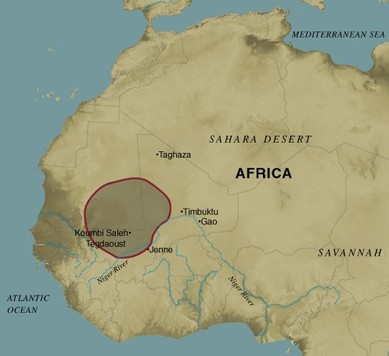Ancient Ghana Empire - Wagadou Empire
Economy - Trade
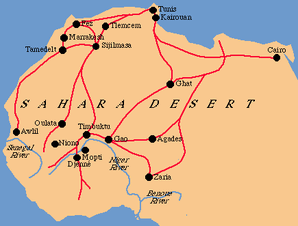
Ancient Ghana was located in West Africa between the Niger and Senegal Rivers. The rivers were imperative to Ghana because their economy was based on trade and at that time, rivers were the fastest way to carry goods. Gold was plentiful around Nigeria and Senegal. Gold was exported to West Africans and in return, Ghana received salt, which was abundant in the Sahara. The king controlled the gold-salt trade routes across West Africa. The two trade routes met in the marketplaces of Ghana, where the king collected taxes from any traders and all goods entering or leaving his land. Through the collection of taxes, Ghana became wealthy. The flow of gold into the empire was also very great. So great, in fact, that Ghana was called the "land of gold." Through these trade routes, Ghana was able to maintain a stable economy and remain powerful.
Government
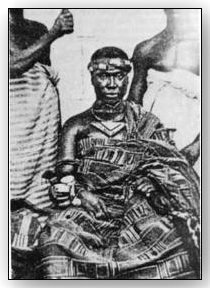
Ancient Ghana, also known as the Wagadou Empire, was a monarchy. The king of Ghana was regarded by the people to be a semidivine figure who kept justice and order. The capital of Ghana was Kumbi Saleh, which was divided into two separate, walled towns about six miles apart. The first town mainly consisted of the royal palace, surrounded by complex domed buildings. This is where the king of Ghana lived. In the second town of Kumbi Saleh, Muslim merchants from north of the Sahara lived in luxurious stone homes. These merchants were lured into Ghana by the wealth of gold and their prosperity helped make Kumbi Saleh a center of trade. There is limited information about ancient Ghana's government and its structure. It is accepted by historians that Ghana seemed to have a central region surrounded by vassal states. These vassal states were ruled by "lesser" kings. The kings also had officials that advised him and surrounded his throne when he administered justice.
Culture - Spread of Islam
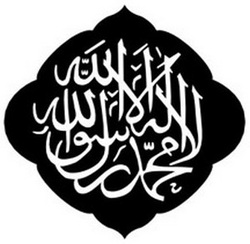
The languages spoken in ancient Ghana were Soninke and Mande. There were traditional religions that were practiced but Islam greatly spread throughout Ghana and influenced the culture of ancient Ghana. Muslim merchants from the Sahara brought their faith to Ghana. Islam spread very slowly at first. The king incorporated Muslims into his court and appointed them as counselors, officials, and treasurers. In this way, the king gradually absorbed Muslim military technology and government ideals. Muslims also introduced many aspects of their culture in ancient Ghana including their written language, coinage, business methods, and styles of architecture. At this time, some people adopted and embraced Islam, but the Soninke people continued to follow their own traditional religions.
In about 1050, the Almoravids, Muslims from North Africa, initiated a campaign to spread their form of Islam. Ghana was eventually overwhelmed by the Almoravids, but they were unable to control and maintain such a distant land. Due to this, Ghana was taken by the West African Kingdom of Mali.
In about 1050, the Almoravids, Muslims from North Africa, initiated a campaign to spread their form of Islam. Ghana was eventually overwhelmed by the Almoravids, but they were unable to control and maintain such a distant land. Due to this, Ghana was taken by the West African Kingdom of Mali.
Innovations
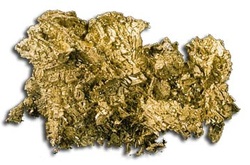
Ancient Ghana was known as the "land of gold." There was a great abundance of gold around the Niger and Senegal Rivers. With this surplus of mineral resource, Ghana was able to greatly boost its economy and create trade routes and relationships. The people of ancient Ghana also used gold as weights for measurement and as a means to assist in trade.
